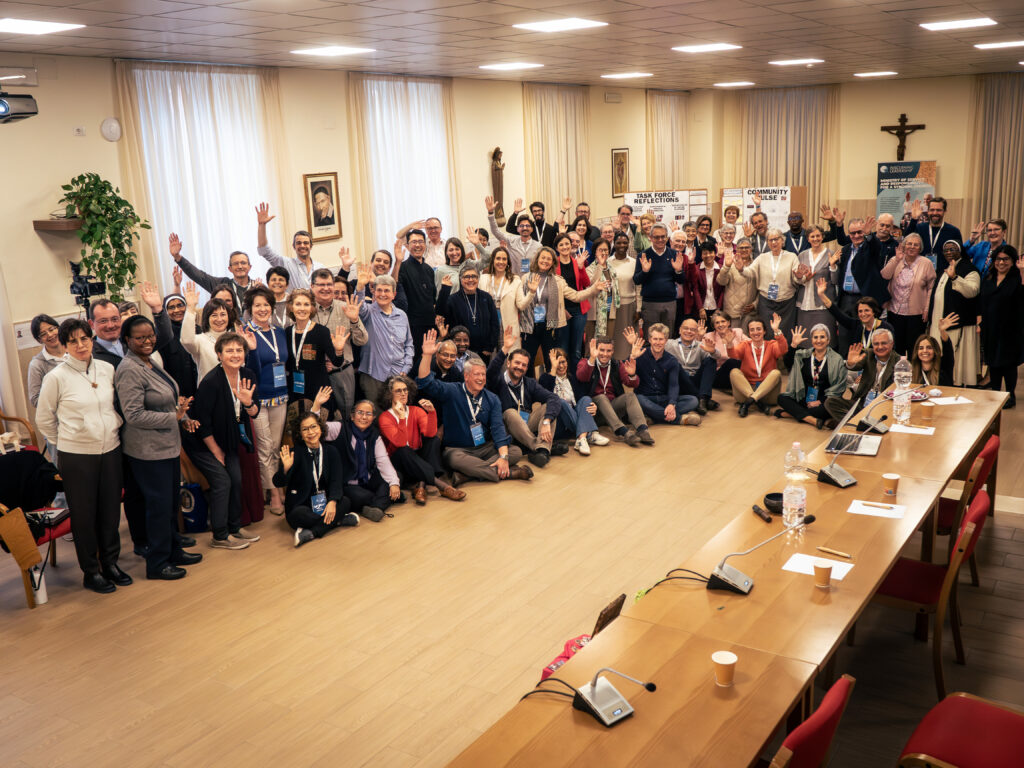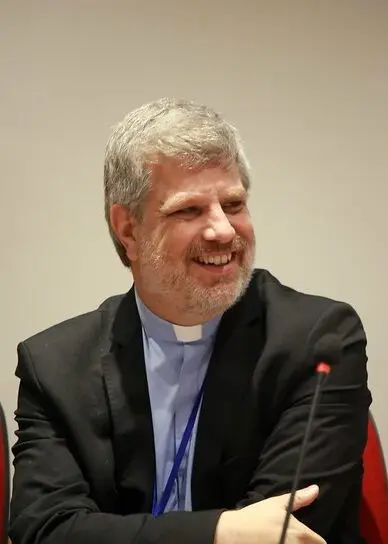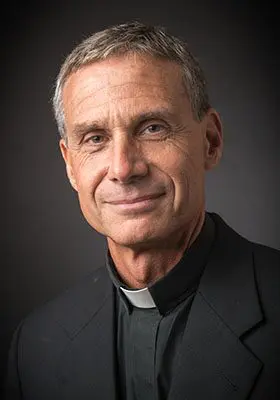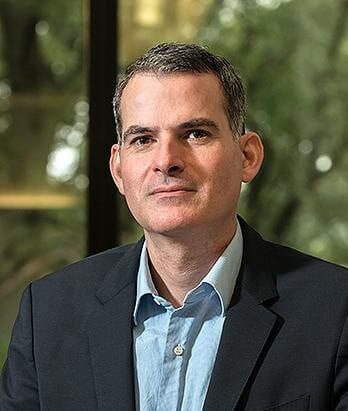Sisters and Brothers in Christ,
Among the key questions that we are exploring in the Synod is the question of authority in the Church, including its origin, proper use, and relationship to participation. While we are called by Jesus at the last supper to express authority in humble and loving service, we know that this is not always the way authority in the Church is experienced. In fact, in the synod listening phase at the diocesan level, many voices from around the world expressed how painful and wounding it can be when authority is used in a unilateral, top down way without consideration or consultation. Or, even more seriously, we know how damaging it is when those who have sacred and formal authority by virtue of ordination abuse it in their treatment of the vulnerable.
In the passage from Sunday’s Gospel, Matt 22:15-21, the issue of authority is at the heart of the dilemma posed by the Pharisees in their attempt to entrap Jesus. We all know how Jesus not only reads their intentions and sees through their trap, but that he also outmaneuvers them by situating their dilemma in a wider frame of reference. Their limited, either/or, legalistic reasoning is no match for his creative, inspired, both/and thinking. As Jesus outwits them, he also instructs them to return their focus to God’s will and intention, rather than that of merely human conventions or rules. He reminds them that ultimately, all authority is sourced from God, and should be carefully administered in a way consistent with God’s preference for mercy over sacrifice, for love over the law, for the reality of people’s circumstances more than the abstract ideal.

Jesus confronts the Pharisees. Bartolomeo Manfredi – Il tributo a Cesare, c. 1610-1620
In this way, Jesus reminds all of us who are given roles of authority and responsibility that we must first of all attend to what it is God desires from our service. For example, we see how Jesus exercises his authority in diverse and discerning ways according to the persons, circumstances, and needs he encounters. He uses his authority over the demonic forces, but never against people. Even with the Pharisees, he enters into relationship, and confronts them with questions or their own hypocrisy, but never with coercion. And with others- his disciples, the various diverse peoples of Galilee, Judea, the Samaritan territory, and the Hellenistic towns of the Decapolis, he meets people in a way that is mutual, respectful, balancing his teaching authority with the willingness to listen and learn from the people he encounters.
His authority makes space for others to exercise their faith, take up their missions, and express their gifts. Jesus increased his authority even as he shares it with others, and paradoxically, receives the fullness of his authority by allowing himself to be taken and crucified. Even if his Kingdom is not of this world, we are nonetheless called to imitate his exercise of authority in this world.
How do we understand and relate to the authority we have been given? Whatever our job description, do we listen first to what God inspires us to contribute through our gifts and skills, in our ways of relating to others, and especially in the ways that we take and make decisions?
Do we pray and discern how we might be obedient and good servants, using this resource from God to contribute something to the world, and to the Kingdom?
With sibling affection,
David and the Discerning Leadership Team
__________________________________________________________________________________________________________________________________________________
Todo procede de Dios y pertenece a Dios
Hermanas y hermanos en Cristo,
Entre las cuestiones clave que estamos explorando en el Sínodo está la de la autoridad en la Iglesia, incluyendo su origen, su uso adecuado y su relación con la participación. Aunque Jesús nos llamó en la última cena a expresar la autoridad en un servicio humilde y amoroso, sabemos que no siempre es así como se experimenta la autoridad en la Iglesia. De hecho, en la fase de escucha del sínodo a nivel diocesano, muchas voces de todo el mundo expresaron lo doloroso e hiriente que puede ser cuando la autoridad se utiliza de forma unilateral, de arriba abajo, sin consideración ni consulta. O, lo que es aún más grave, sabemos lo perjudicial que es cuando quienes tienen autoridad sagrada y formal en virtud de la ordenación abusan de ella en su trato con los vulnerables.
En el pasaje del Evangelio del domingo, Mateo 22:15-21, la cuestión de la autoridad está en el centro del dilema planteado por los fariseos en su intento de atrapar a Jesús. Todos sabemos que Jesús no sólo leyó sus intenciones y descubrió su trampa, sino que también se les adelantó al situar su dilema en un marco de referencia más amplio. Su razonamiento limitado, legalista, no es rival para su pensamiento creativo e inspirado. Al burlarlos, Jesús también les instruye para que vuelvan a centrarse en la voluntad y la intención de Dios, y no en las convenciones o normas meramente humanas. Les recuerda que, en última instancia, toda autoridad procede de Dios y debe administrarse cuidadosamente de forma coherente con la preferencia de Dios por la misericordia sobre el sacrificio, por el amor sobre la ley, por la realidad de las circunstancias de las personas más que por el ideal abstracto.

Jesús se enfrenta a los fariseos. Bartolomeo Manfredi – Il tributo a Cesare, c. 1610-1620
De este modo, Jesús nos recuerda a todos los que desempeñamos funciones de autoridad y responsabilidad que, en primer lugar, debemos atender a lo que Dios desea de nuestro servicio. Por ejemplo, vemos cómo Jesús ejerce su autoridad de maneras diversas y con discernimiento, según las personas, las circunstancias y las necesidades que encuentra. Utiliza su autoridad sobre las fuerzas demoníacas, pero nunca contra las personas. Incluso con los fariseos, entra en relación y se enfrenta a ellos con preguntas o con su propia hipocresía, pero nunca con coacción. Y con los demás -sus discípulos, los diversos pueblos de Galilea, Judea, el territorio samaritano y las ciudades helenísticas de la Decápolis-, se encuentra con la gente de un modo mutuo, respetuoso, equilibrando su autoridad docente con la voluntad de escuchar y aprender de las personas con las que se encuentra.
Su autoridad deja espacio para que los demás ejerzan su fe, asuman sus misiones y expresen sus dones. Jesús acrecienta su autoridad incluso cuando la comparte con los demás y, paradójicamente, recibe la plenitud de su autoridad al dejarse apresar y crucificar. Aunque su Reino no sea de este mundo, estamos llamados a imitar su ejercicio de la autoridad en este mundo.
¿Cómo entendemos y nos relacionamos con la autoridad que se nos ha dado? Cualquiera que sea la descripción de nuestro trabajo, ¿escuchamos primero lo que Dios nos inspira para contribuir a través de nuestros dones y habilidades, en nuestra forma de relacionarnos con los demás y, especialmente, en la forma en que tomamos decisiones?
¿Oramos y discernimos cómo podemos ser obedientes y buenos servidores, utilizando este recurso de Dios para aportar algo al mundo y al Reino?
Con afecto fraterno,
David y el Equipo de Discerning Leadership
__________________________________________________________________________________________________________________________________________________
Tutte le cose vengono da Dio e appartengono a Dio
Sorelle e fratelli in Cristo,
Tra le questioni chiave che stiamo esplorando nel Sinodo c’è quella dell’autorità nella Chiesa, compresa la sua origine, il suo uso corretto e il suo rapporto con la partecipazione. Sebbene siamo stati chiamati da Gesù nell’ultima cena a esprimere l’autorità in un servizio umile e amorevole, sappiamo che questo non è sempre il modo in cui l’autorità nella Chiesa viene vissuta. In effetti, nella fase di ascolto sinodale a livello diocesano, molte voci provenienti da tutto il mondo hanno espresso quanto possa essere doloroso e ferente quando l’autorità viene usata in modo unilaterale, dall’alto verso il basso, senza considerazione o consultazione. O, ancora più seriamente, sappiamo quanto sia dannoso quando coloro che hanno un’autorità sacra e formale in virtù dell’ordinazione ne abusano nel trattare i vulnerabili.
Nel brano del Vangelo di domenica, Matteo 22:15-21, la questione dell’autorità è al centro del dilemma posto dai farisei nel loro tentativo di intrappolare Gesù. Sappiamo tutti che Gesù non solo legge le loro intenzioni e vede la loro trappola, ma li supera anche collocando il loro dilemma in un quadro di riferimento più ampio. I loro ragionamenti limitati, a scelta, legalistici, non sono all’altezza del suo pensiero creativo, ispirato, di entrambe le cose. Mentre Gesù li supera, li istruisce anche a tornare a concentrarsi sulla volontà e sull’intenzione di Dio, piuttosto che su convenzioni o regole meramente umane. Ricorda loro che, in ultima analisi, tutta l’autorità proviene da Dio e deve essere amministrata con attenzione in modo coerente con la preferenza di Dio per la misericordia rispetto al sacrificio, per l’amore rispetto alla legge, per la realtà delle circostanze delle persone più che per l’ideale astratto.

Gesù affronta i farisei. Bartolomeo Manfredi – Il tributo a Cesare, 1610-1620 ca.
In questo modo, Gesù ricorda a tutti noi che abbiamo ruoli di autorità e responsabilità che dobbiamo prima di tutto prestare attenzione a ciò che Dio desidera dal nostro servizio. Per esempio, vediamo come Gesù esercita la sua autorità in modi diversi e discernenti a seconda delle persone, delle circostanze e dei bisogni che incontra. Usa la sua autorità sulle forze demoniache, ma mai contro le persone. Anche con i farisei entra in relazione e li affronta con domande o con la loro ipocrisia, ma mai con la coercizione. E con gli altri – i suoi discepoli, i diversi popoli della Galilea, della Giudea, del territorio samaritano e delle città ellenistiche della Decapoli – incontra le persone in modo reciproco, rispettoso, bilanciando la sua autorità di insegnante con la disponibilità ad ascoltare e imparare dalle persone che incontra.
La sua autorità lascia spazio agli altri per esercitare la loro fede, assumere le loro missioni ed esprimere i loro doni. Gesù accresce la sua autorità anche quando la condivide con gli altri e, paradossalmente, riceve la pienezza della sua autorità lasciandosi prendere e crocifiggere. Anche se il suo Regno non è di questo mondo, siamo comunque chiamati a imitare il suo esercizio dell’autorità in questo mondo.
Come comprendiamo e ci relazioniamo con l’autorità che ci è stata data? Qualunque sia la descrizione del nostro lavoro, ascoltiamo innanzitutto ciò che Dio ci ispira a contribuire attraverso i nostri doni e le nostre capacità, nei nostri modi di relazionarci con gli altri e soprattutto nei modi in cui prendiamo e prendiamo le decisioni?
Preghiamo e discerniamo come essere obbedienti e buoni servitori, usando questa risorsa di Dio per contribuire al mondo e al Regno?
Con affetto fraterno,







 Fr. Giacomo Costa SJ did studies in philosophy and theology, and he also obtained a master's degree in Political and Moral Sociology at the EHESS in Paris.
Fr. Giacomo Costa SJ did studies in philosophy and theology, and he also obtained a master's degree in Political and Moral Sociology at the EHESS in Paris. He is the responsible for Formation at the Society of Jesus.
He is the responsible for Formation at the Society of Jesus. Prof. Rafael Luciani received his licentiate and doctorate in theology from the Pontifical Gregorian University in Rome and a degree in educational sciences with a philosophical orientation from the Universidad Católica "Andrés Bello" in Caracas (Venezuela). He also studied philosophy at the Salesian Pontifical University in Rome and did post-doctoral work at the Julius Maximilians Universität in Würzburg (Germany).
Prof. Rafael Luciani received his licentiate and doctorate in theology from the Pontifical Gregorian University in Rome and a degree in educational sciences with a philosophical orientation from the Universidad Católica "Andrés Bello" in Caracas (Venezuela). He also studied philosophy at the Salesian Pontifical University in Rome and did post-doctoral work at the Julius Maximilians Universität in Würzburg (Germany). Nathalie Becquart serves as Undersecretary of the Secretariat of the Synod of the Bishops since March 2021.
Nathalie Becquart serves as Undersecretary of the Secretariat of the Synod of the Bishops since March 2021. Robert J. Bies (Ph.D., Stanford University) is Professor of Management and Founder of the Executive Master’s in Leadership Program at the McDonough School of Business at Georgetown University. In addition, Dr. Bies is a co-author of the book, Getting Even: The Truth About Workplace Revenge—And How to Stop It.
Professor Bies’s current research focuses on leadership, the delivery of bad news, organizational justice, and revenge and forgiveness in the workplace.
Robert J. Bies (Ph.D., Stanford University) is Professor of Management and Founder of the Executive Master’s in Leadership Program at the McDonough School of Business at Georgetown University. In addition, Dr. Bies is a co-author of the book, Getting Even: The Truth About Workplace Revenge—And How to Stop It.
Professor Bies’s current research focuses on leadership, the delivery of bad news, organizational justice, and revenge and forgiveness in the workplace.